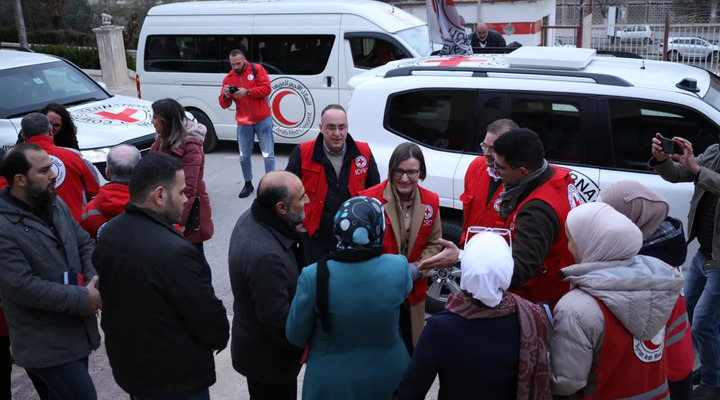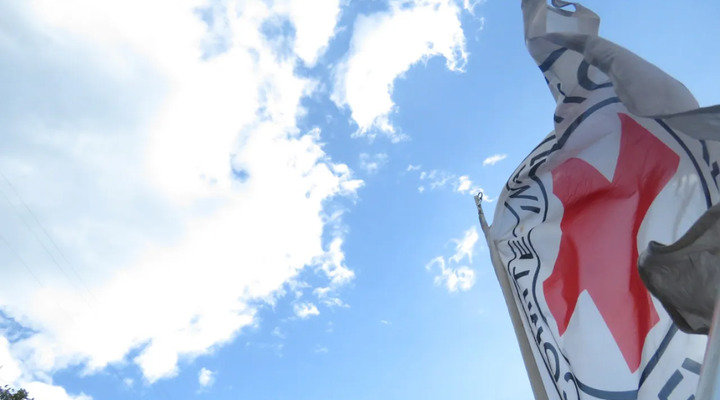Mozambique: ICRC director of operations says combined impact of conflict and extreme weather in Cabo Delgado threaten public health
Massive displacement in Cabo Delgado, Mozambique's northern province, has put an enormous strain on existing water and health facilities, some of which were previously damaged by extreme weather events. As a result, a concerning shortage of safe water, sanitation and health services is a looming threat to public health for displaced people and host communities.
"A lot of people depend on this type of water and this is definitely not to any standards of public health,” said Dominik Stillhart, director of operations for the International Committee of the Red Cross (ICRC), who is completing a three-day visit to Cabo Delgado. "I think it is very important to pay very serious attention to what is happening here, especially in the North of Mozambique."
Mozambique has increasingly been facing the compounded impact of armed conflict and climate change in recent years, which takes a toll on people's health. Recurring and more frequent cyclones and floods have damaged health and water facilities, such as the hospital on Ibo, which was the only health facility serving the archipelago. More than 800,000 people, one-third of the province's entire population, have fled their homes due to the escalation of the armed conflict, finding shelter in urban areas and on the islands. Displaced people frequently settle down in city outskirts, outside the coverage of the water distribution systems.
Rapid population movement and limited access to safe water sources in precarious settlements led to the rise of waterborne diseases like cholera and diarrhea. The ICRC has observed a correlation between the concentration of groups of displaced people, the absence of protected water sources and the spread of waterborne diseases. According to WHO, the number of cholera cases in Cabo Delgado at the beginning of August 2021 was 3,400, compared to approximately 2,200 from the same period last year. In the first semester of 2021, 28,602 cases of diarrhea have been registered in the province, of which 40% of cases were registered in districts where ICRC has focused its work, such as Montepuez and Ibo islands. Diarrhea has become the second cause of death among children under five. COVID represents an additional risk, partially associated with the lack of hygiene.
A lack of functioning health facilities reduced the capacity of the health system to detect and respond to disease outbreaks. 80% of health centres in the nine most conflict-affected northern districts of Cabo Delgado are not functioning. The already fragile health infrastructure has been further weakened as a result of the armed conflict, even as the demand for health services increased by 20% to 30% in southern areas of Cabo Delgado province that have been receiving displaced people. The overstretched health facilities have been struggling with the shortage of space, overcrowding, and lack of staff and medical supplies.
The ICRC is working with local authorities to rehabilitate the existing water and health infrastructures, as well as build new ones, to improve access to health and clean water and prevent the spread of deadly diseases, both on the mainland -- for instance in the city of Montepuez -- as well as on the islands. The ICRC is constructing a new hospital on Ibo which will serve the entire 30-island archipelago. Because the coastal areas of Mozambique are vulnerable to climate shocks, all of ICRC’s new rehabilitation and construction projects are systematically conceived and built with resilient infrastructure to prevent as much as possible potential damage by natural catastrophes.
For further information, please contact:
Alyona Synenko: aynenko@icrc.org or +254 716 897265
SHOTLIST
Location: Montepuez
Length: 5.55 min
Format:
Cameraperson: Mark Kamau
Producer: Mark Kamau
ICRC ref: e.g.
Filming date: 07.10.2021
Copyright: ICRC access all
1
00:00:00,000 --> 00:00:23,139
Montepuez, Northern Mozambique. Various shots, women and children drawing water from a pond.
2
00:00:23,139 --> 00:00:24,574
Interview: Mendinha, Resident Montepuez.
I come from far away.
3
00:00:24,574 --> 00:00:26,609
I take one hour walking here.
4
00:00:26,609 --> 00:00:36,369
We live six people at home. This water is for drinking, the water is also good for washing clothes and dishes, but we mostly collect it for drinking.
5
00:00:36,369 --> 00:00:40,006
Medium shot of murky water
6
00:00:40,006 --> 00:00:44,227
Medium shot. A young girl scooping water into a basin
7
00:00:44,227 --> 00:00:49,549
Long shot. A woman filling a jerrycan with water.
8
00:00:49,549 --> 00:00:55,071
Interview: Dominik Stillhart, Director of Operations, ICRC. Well you can really see the impact of the increased number of people
9
00:00:55,071 --> 00:00:59,492
There is only one spring and we are the end of the dry season.
10
00:01:00,160 --> 00:01:03,613
People from all over this part of town
11
00:01:03,613 --> 00:01:07,050
with many IDP's they have to walk up to an hour,
12
00:01:07,050 --> 00:01:10,019
to fetch water from here, this is the only spring.
13
00:01:10,386 --> 00:01:13,356
and you can see its an unprotected spring,
14
00:01:13,356 --> 00:01:15,058
there is washing going on,
15
00:01:15,058 --> 00:01:23,600
and you can really see here why for instance cholera is such a big issue in this town.
16
00:01:23,600 --> 00:01:30,373
A lot of people depend on this type of water and you can see for yourself,
17
00:01:30,373 --> 00:01:35,678
this is definitely not to any standards of public health.
18
00:01:35,678 --> 00:01:43,153
Matemo island, Northern Mozambique. Various shot. Dirty water around a well.
19
00:01:43,153 --> 00:01:51,311
Montepuez, Northern Mozambique. Various shots. Women washing clothes.
20
00:01:51,311 --> 00:02:07,894
Montepuez, Northern Mozambique. Various shots. Construction of a new health centre wing.
21
00:02:07,894 --> 00:02:11,080
Interview: Angel Carballo, Engineer, ICRC.
We find already areas which were
extremely vulnerable
22
00:02:11,080 --> 00:02:15,852
which were already struggling to deliver
service to the existing resident population,
23
00:02:15,852 --> 00:02:18,872
and now they see this
massive arrival population
24
00:02:18,872 --> 00:02:23,059
so there are obviously two axis where this manifests in the most dramatic way
25
00:02:23,059 --> 00:02:24,861
one is the health services
26
00:02:24,861 --> 00:02:27,247
and the other is water supply.
27
00:02:27,247 --> 00:02:50,286
Matemo island, Northern Mozambique. Medium shot. Woman with baby on the back strains as she pumps water into a bucket.
28
00:02:50,286 --> 00:03:04,267
Medium shot. A young man helps lift buckets of water for women balancing them on their heads.
29
00:03:04,267 --> 00:03:22,769
Longshot into medium shot into close up. Two women and a boy, balancing water on their heads walk towards the camera. Other women walk into the shot on their way to the well. Camera pans to stay with original women.
30
00:03:22,769 --> 00:03:35,665
Follow shot. Camera follows women balancing water containers on their heads as they walk a bushy path.
31
00:03:35,665 --> 00:03:42,722
Interview: Dominik Stillhart, Director of Operations, ICRC. I think it is very important to pay very serious attention
32
00:03:42,722 --> 00:03:46,209
to what is happening here especially in the North of Mozambique.
33
00:03:46,225 --> 00:03:52,382
This is a situation that has taken a very very high toll on many people.
34
00:03:52,382 --> 00:03:57,370
We spoke to some people here who have been displaced multiple times,
35
00:03:57,370 --> 00:03:59,706
in the past 12-18 months;
36
00:04:00,006 --> 00:04:04,944
and there is a very serious need to provide more support here
37
00:04:04,944 --> 00:04:07,580
in this area of North of Mozambique.
38
00:04:07,580 --> 00:04:16,773
Montepuez, Northern Mozambique. Various shots drilling of new bore hole.
39
00:04:16,773 --> 00:04:35,408
Montepuez, Northern Mozambique. Young women drawing water from ICRC rehabilitated well.
40
00:04:35,408 --> 00:04:44,600
Montepuez, Northern Mozambique. Various shots building of health centres
41
00:04:44,600 --> 00:05:14,430
Montepuez, Northern Mozambique. Various shots ICRC's Director of Operations inspecting progress of a health centre's new wing construction
42
00:05:14,430 --> 00:05:22,455
Moantepuez, Northern Mozambique. A boy and two women carrying water inside a camp.
43
00:05:22,455 --> 00:05:28,895
Quirambo Island, Various shots of broken water pump
44
00:05:28,911 --> 00:05:35,351
Various shots. Sandy water well.
45
00:05:35,351 --> 00:05:41,924
Metuge, Northern Mozambique. Women drawing water from shallow wells.
46
00:05:41,924 --> 00:05:55,988
Montepuez, Northern Mozambique. Medium Shot. A young girl balances a bucket of water on her head, WALKS AWAY and camera pans.

